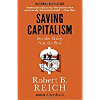{vembed Y=nulcmxH9FGg}
Last August, the Business Roundtable – an association of CEOs of America’s biggest corporations – announced with great fanfare a “fundamental commitment to all of our stakeholders” and not just their shareholders.
They said “investing in employees, delivering value to customers, and supporting outside communities“ is now at the forefront of their business goals — not maximizing profits.Baloney. Corporate social responsibility is a sham.One Business Roundtable director is Mary Barra, CEO of General Motors. Just weeks after making the Roundtable commitment, and despite GM’s hefty profits and large tax breaks, Barra rejected workers’ demands that GM raise their wages and stop outsourcing their jobs.
Earlier in the year GM shut its giant assembly plant in Lordstown, Ohio. Nearly 50,000 GM workers then staged the longest auto strike in 50 years. They won a few wage gains but didn’t save any jobs. Barra was paid $22 million last year. How’s that for corporate social responsibility?Another prominent CEO who made the phony Business Roundtable commitment was AT&T’s Randall Stephenson, who promised to use the billions in savings from the Trump tax cut to invest in the company’s broadband network and create at least 7,000 new jobs.
Instead, even before the coronavirus pandemic, AT&T cut more than 23,000 jobs and demanded that employees train lower-wage foreign workers to replace them. Let’s not forget Jeff Bezos, CEO of Amazon and its Whole Foods subsidiary. Just weeks after Bezos made the Business Roundtable commitment, Whole Foods announced it would be cutting medical benefits for its entire part-time workforce. The annual saving to Amazon from this cost-cutting move is roughly what Bezos – whose net worth is $117 billion – makes in a few hours.
Bezos’ wealth grows so quickly, this number has gone up since you started watching this video.GE’s CEO Larry Culp is also a member of the Business Roundtable. Two months after he made the commitment to all his stakeholders, General Electric froze the pensions of 20,000 workers in order to cut costs. So much for investing in employees. Dennis Muilenburg, the former CEO of Boeing, also committed to the phony Business Roundtable pledge. Shortly after making the commitment to “deliver value to customers,” Muilenburg was fired for failing to act to address the safety problems that caused the 737 Max crashes that killed 346 people.
After the crashes, he didn’t issue a meaningful apology or even express remorse to the victims’ families and downplayed the severity of the fallout to investors, regulators, airlines, and the public. He was rewarded with a $62 million farewell gift from Boeing on his way out.Oh, and the chairman of the Business Roundtable is Jamie Dimon, CEO of Wall Street’s largest bank, JPMorgan Chase. Dimon lobbied Congress personally and intensively for the biggest corporate tax cut in history, and got the Business Roundtable to join him. JPMorgan raked in $3.7 billion from the tax cut. Dimon alone made $31 million in 2018. That tax cut increased the federal debt by almost $2 trillion. This was before Congress spent almost $3 trillion fighting the pandemic – and delivering a hefty portion as bailouts to the biggest corporations, many of whom signed the Business Roundtable pledge.
As usual, almost nothing has trickled down to America’s working class and poor. The truth is, American corporations are sacrificing workers and communities as never before in order to further boost runaway profits and unprecedented CEO pay. And not even a tragic pandemic is changing that. Americans know this. A record 76 percent of U.S. adults believe major corporations have too much power.
The only way to make corporations socially responsible is through laws requiring them to be – for example, giving workers a bigger voice in corporate decision making, requiring that corporations pay severance to communities they abandon, raising corporate taxes, busting up monopolies, and preventing dangerous products (including faulty airplanes) from ever reaching the light of day. If the CEOs of the Business Roundtable and other corporations were truly socially responsible, they’d support such laws, not make phony promises they clearly have no intention of keeping. Don’t hold your breath.
The only way to get such laws enacted is by reducing corporate power and getting big money out of our politics. The first step is to see corporate social responsibility for the sham it is. The next step is to emerge from this pandemic and economic crisis more resolved than ever to rein in corporate power, and make the economy work for all.
About the Author
 ROBERT B. REICH, Chancellor’s Professor of Public Policy at the University of California at Berkeley, was Secretary of Labor in the Clinton administration. Time Magazine named him one of the ten most effective cabinet secretaries of the last century. He has written thirteen books, including the best sellers “Aftershock" and “The Work of Nations." His latest, "Beyond Outrage," is now out in paperback. He is also a founding editor of the American Prospect magazine and chairman of Common Cause.
ROBERT B. REICH, Chancellor’s Professor of Public Policy at the University of California at Berkeley, was Secretary of Labor in the Clinton administration. Time Magazine named him one of the ten most effective cabinet secretaries of the last century. He has written thirteen books, including the best sellers “Aftershock" and “The Work of Nations." His latest, "Beyond Outrage," is now out in paperback. He is also a founding editor of the American Prospect magazine and chairman of Common Cause.
Books by Robert Reich
Saving Capitalism: For the Many, Not the Few -- by Robert B. Reich
 America was once celebrated for and defined by its large and prosperous middle class. Now, this middle class is shrinking, a new oligarchy is rising, and the country faces its greatest wealth disparity in eighty years. Why is the economic system that made America strong suddenly failing us, and how can it be fixed?
America was once celebrated for and defined by its large and prosperous middle class. Now, this middle class is shrinking, a new oligarchy is rising, and the country faces its greatest wealth disparity in eighty years. Why is the economic system that made America strong suddenly failing us, and how can it be fixed?
Click here for more info or to order this book on Amazon.
Beyond Outrage: What has gone wrong with our economy and our democracy, and how to fix it -- by Robert B. Reich
 In this timely book, Robert B. Reich argues that nothing good happens in Washington unless citizens are energized and organized to make sure Washington acts in the public good. The first step is to see the big picture. Beyond Outrage connects the dots, showing why the increasing share of income and wealth going to the top has hobbled jobs and growth for everyone else, undermining our democracy; caused Americans to become increasingly cynical about public life; and turned many Americans against one another. He also explains why the proposals of the “regressive right” are dead wrong and provides a clear roadmap of what must be done instead. Here’s a plan for action for everyone who cares about the future of America.
In this timely book, Robert B. Reich argues that nothing good happens in Washington unless citizens are energized and organized to make sure Washington acts in the public good. The first step is to see the big picture. Beyond Outrage connects the dots, showing why the increasing share of income and wealth going to the top has hobbled jobs and growth for everyone else, undermining our democracy; caused Americans to become increasingly cynical about public life; and turned many Americans against one another. He also explains why the proposals of the “regressive right” are dead wrong and provides a clear roadmap of what must be done instead. Here’s a plan for action for everyone who cares about the future of America.
Click here for more info or to order this book on Amazon.

Related Books:
On Tyranny: Twenty Lessons from the Twentieth Century
by Timothy Snyder
This book offers lessons from history for preserving and defending democracy, including the importance of institutions, the role of individual citizens, and the dangers of authoritarianism.
Click for more info or to order
Our Time Is Now: Power, Purpose, and the Fight for a Fair America
by Stacey Abrams
The author, a politician and activist, shares her vision for a more inclusive and just democracy and offers practical strategies for political engagement and voter mobilization.
Click for more info or to order
How Democracies Die
by Steven Levitsky and Daniel Ziblatt
This book examines the warning signs and causes of democratic breakdown, drawing on case studies from around the world to offer insights into how to safeguard democracy.
Click for more info or to order
The People, No: A Brief History of Anti-Populism
by Thomas Frank
The author offers a history of populist movements in the United States and critiques the "anti-populist" ideology that he argues has stifled democratic reform and progress.
Click for more info or to order
Democracy in One Book or Less: How It Works, Why It Doesn't, and Why Fixing It Is Easier Than You Think
by David Litt
This book offers an overview of democracy, including its strengths and weaknesses, and proposes reforms to make the system more responsive and accountable.



























